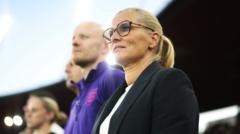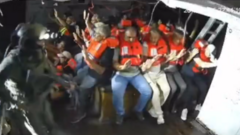Why Were Two Jewish Comedians' Edinburgh Fringe Shows Canceled Over Safety Concerns?

Understanding the Impact of Censorship on Jewish Comedians: The Case of Rachel Creeger and Philip Simon
The world of comedy is often seen as a space where laughter transcends boundaries, bringing people together through shared experiences and humor. However, recent events surrounding Jewish comedians Rachel Creeger and Philip Simon have highlighted the unsettling reality of censorship and safety concerns that can overshadow artistic expression. Both comedians were set to perform at the Whistlebinkies bar during the Edinburgh Fringe Festival, only to find their shows abruptly canceled due to alleged safety fears. This article delves into the implications of this incident on the comedy scene, the challenges faced by Jewish performers, and the broader issues of freedom of expression in today’s society.
The Edinburgh Fringe Festival: A Platform for Diverse Voices
The Edinburgh Fringe Festival, one of the largest arts festivals in the world, is celebrated for its diversity and inclusivity. Each year, thousands of performers from various backgrounds come together to showcase their talents. This festival serves as a crucial platform for emerging artists and established acts alike, allowing them to share their unique perspectives and stories. However, the recent cancellation of Creeger and Simon’s shows raises questions about the safety and acceptance of Jewish voices within this vibrant tapestry of performance art.
The Shows and Their Significance
Creeger’s show, titled "Ultimate Jewish Mother," was intended to be a heartfelt reflection on the complexities and humor of Jewish motherhood. With previous successful performances at Whistlebinkies, Creeger aimed to connect with audiences through relatable anecdotes and comedic storytelling. On the other hand, Simon’s "Jew-O-Rama" was designed to showcase a variety of Jewish comedic talents, blending humor with cultural commentary. Both shows offered a unique lens into Jewish life, fostering understanding and connection through laughter.
Safety Concerns and Censorship: The Trigger for Cancellation
In the weeks leading up to the festival, Creeger and Simon were notified of the cancellation, citing safety fears expressed by the venue staff. This decision came in the wake of heightened police presence and previous incidents of graffiti related to the Israeli-Palestinian conflict. The decision to cancel the shows was framed as a precautionary measure, but it raises fundamental questions about who gets to perform and under what conditions. The comedians voiced their frustration, highlighting that the immediate solution to safety concerns seemed to be the removal of Jewish acts from the festival lineup.
The Broader Impact on Jewish Performers
Creeger and Simon’s experience is not an isolated incident. Jewish performers in the UK have reported facing increasing challenges, including censorship and a perceived bias against their work. Creeger articulated that this incident is part of a larger trend of silent boycotts against Jewish artists, while Simon pointed out that such actions would likely provoke outrage if directed toward other ethnic minorities. The implications of these cancellations extend beyond the individual artists; they reflect a chilling atmosphere for artistic expression, where fear of backlash can stifle creativity.
Financial Burdens of Canceled Performances
The financial implications of the canceled shows weigh heavily on both comedians. With costs accumulating to approximately £2,500 for travel, accommodation, and marketing, the reality of such a sudden cancellation is devastating. Many performers rely on the Edinburgh Fringe to recoup their investments and gain exposure. The cancellation not only disrupts their financial stability but also puts their careers at risk, as visibility at such festivals can lead to future opportunities.
Responses from the Comedy Community
In the aftermath of the cancellations, the comedy community has rallied around Creeger and Simon, advocating for greater awareness of the challenges faced by Jewish artists. Free Fringe CEO Luke Meredith stated that the decision to cancel the shows was made solely by the venue and acknowledged the difficulty of finding alternative slots for the performances. This incident has sparked discussions about the need for venues to protect artistic expression while ensuring safety for all performers.
Examining the Role of Comedy in Social Commentary
Comedy serves as a powerful tool for social commentary, allowing artists to address complex issues in a relatable manner. Creeger and Simon’s shows were designed to explore themes of identity, culture, and shared experiences, yet they were sidelined due to external pressures. This situation raises critical questions about the role of comedy in fostering dialogue and understanding in an increasingly polarized world.
The Need for Support and Solidarity
As the situation unfolds, it’s evident that solidarity among artists and audiences is crucial. The cancellation of shows like Creeger and Simon’s underscores the need for a collective effort to ensure that diverse voices can be heard without fear of retribution. Venues must consider the implications of their decisions and strive to create environments that are not only safe but also inclusive of various perspectives.
Moving Forward: The Future of Comedy and Expression
The incident involving Rachel Creeger and Philip Simon is a call to action for the comedy community and society at large. As artists navigate the complexities of censorship and safety, it is imperative to foster an atmosphere that encourages open dialogue and artistic freedom. The future of comedy depends on the ability of performers to express themselves authentically, without fear of backlash or exclusion.
FAQs
What led to the cancellation of Rachel Creeger and Philip Simon's shows at the Edinburgh Fringe?
The shows were canceled due to safety concerns raised by the venue staff, following an announcement of increased police supervision in light of existing safety issues for Jewish acts.
How did Rachel Creeger and Philip Simon respond to their shows being canceled?
Both comedians expressed disappointment and frustration, highlighting the ongoing challenges faced by Jewish performers and the implications of censorship in the arts.
What are the financial implications of the canceled shows for the comedians?
Creeger and Simon have incurred significant costs, approximately £2,500, for their shows, which included travel, accommodation, and marketing expenses. The cancellation poses a financial burden and threatens their careers.
What can be done to support Jewish comedians facing similar challenges?
Raising awareness, advocating for inclusive policies, and supporting venues that encourage diverse voices can help create a more welcoming environment for all performers, including Jewish comedians.
As we reflect on the experiences of Rachel Creeger and Philip Simon, we must ask ourselves: how can we ensure that art and comedy remain safe havens for diverse voices? The answer lies in fostering understanding, promoting inclusivity, and standing against censorship. #ComedyForChange #JewishVoices #FreedomOfExpression
Published: 2025-07-26 19:21:05 | Category: Entertainment



